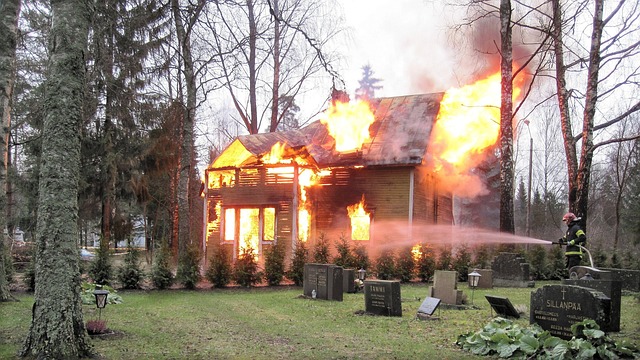Distressed property sales in California, often due to wildfires or emergencies, involve quick sales of homes with structural issues. Homeowners can navigate legalities and market challenges by working with professionals for repairs, accurate appraisals, strategic marketing, and transparent communication. This approach maximizes potential, attracts buyers, and ensures successful sales despite fire damage, as demonstrated in Los Angeles case studies.
“In California, distressed property sales—particularly those involving fire-damaged homes—present unique opportunities and challenges. This comprehensive guide delves into the intricacies of understanding and navigating these sales. We explore the significant impact of fire damage on the local real estate market, dissecting legal considerations for buyers and sellers. Additionally, we offer strategic insights for successful distressed home sales, highlight common pitfalls, and provide compelling case studies from real-life transactions. For California real estate professionals looking to buy or sell fire-damaged properties, this article offers invaluable knowledge.”
- Understanding Distressed Property Sales: A Comprehensive Overview
- The Impact of Fire Damage on California Real Estate Market
- Legal Considerations: Buying and Selling Fire-Damaged Properties
- Strategies for Successful Distressed Home Sales in California
- Common Challenges and How to Overcome Them
- Case Studies: Real-Life Examples of Fire Damaged House Sales
Understanding Distressed Property Sales: A Comprehensive Overview

Distressed property sales encompass situations where homeowners face challenges that force them to hastily sell their homes, often at a significant discount. These can include financial hardships like foreclosure, divorce, or job loss, as well as unforeseen circumstances such as natural disasters (like wildfires in California), which render properties uninhabitable. When a homeowner is “distressed,” they may need to sell quickly to avoid further financial ruin or legal issues.
In the case of selling a fire-damaged house in California, for instance, homeowners might opt for distressed property sales as a means to recover some value from their asset before it’s too late. This process involves working with specialized real estate agents or investment firms that cater to such situations, ensuring a swift and often less than conventional transaction. The key differentiator here is the urgency and the potential for buyers who are willing to overlook minor repairs or structural issues due to the unique circumstances surrounding the property.
The Impact of Fire Damage on California Real Estate Market

Fire damage can significantly impact the real estate market in California, particularly when it comes to distressed property sales. A home affected by a fire may experience a decline in value, which can make it challenging for owners to sell at a fair market price. Potential buyers often view fire-damaged properties with caution, considering the potential costs of repairs and renovations. This hesitancy can result in longer days on the market and lower offers, especially if the damage is extensive.
In California, where the real estate market is competitive, selling a fire-damaged house can be a complex process. However, it’s not impossible. Many homeowners choose to repair and restore their properties, aiming to capitalize on the strong housing demand in the state. The key lies in accurately assessing the damage, obtaining accurate appraisals, and presenting the property in a way that highlights its potential rather than focusing solely on the fire’s impact. This strategic approach can help in attracting buyers who are willing to invest in a distressed property, ultimately facilitating a successful sale.
Legal Considerations: Buying and Selling Fire-Damaged Properties

When considering to buy or sell a fire-damaged property in California, it’s crucial to understand the legal implications and potential hurdles. In the state of California, buyers and sellers of fire-damaged properties must adhere to specific regulations and disclosure requirements. If a house has been affected by a fire, it’s essential to conduct thorough inspections and appraisals to determine the extent of damage and its impact on the property’s value.
The legal considerations extend to zoning laws and building codes, which may restrict the renovation or reuse of such properties. Buyers should consult with real estate professionals and attorneys who specialize in these matters to ensure they understand any potential liabilities. For sellers, transparent disclosure is key; providing accurate information about the fire damage history can help avoid future legal issues and facilitate a smoother sale process for a sell fire damaged house California.
Strategies for Successful Distressed Home Sales in California

In California, successful distressed home sales require a strategic approach, especially for properties that have sustained damage, such as those affected by fires. One key strategy is to partner with experienced local contractors who can accurately assess and repair damage, enhancing the property’s appeal and value. This not only ensures better sale prices but also streamlines the process, as buyers are more likely to be attracted to a well-maintained home.
Additionally, focusing on the unique features or potential benefits of the fire-damaged house is essential. For instance, highlighting updated safety systems, modern construction materials, or energy-efficient upgrades can attract eco-conscious or risk-averse buyers. Effective marketing strategies, including leveraging online platforms and social media, are crucial for reaching a wider audience. Furthermore, offering flexible terms or incentives can help attract cash buyers who often move quickly in the distressed property market.
Common Challenges and How to Overcome Them

Selling a fire-damaged home in California can be a challenging process, but with the right approach, these obstacles can be overcome. One of the primary challenges is assessing and repairing the damage, which often involves extensive costs. Property owners must carefully evaluate the extent of the harm caused by the fire, including structural integrity issues, water damage from firefighting efforts, and smoke soot residue. Engaging the services of experienced professionals like firefighters, restoration specialists, and appraisers is crucial for accurately determining repair needs and associated expenses.
To navigate these challenges effectively, consider these strategies: first, document every aspect of the damage through photography and video to support insurance claims and future repairs; second, research California’s building codes and fire safety regulations to ensure all necessary repairs meet legal standards; third, stay informed about local real estate market trends and consult with a knowledgeable real estate agent specializing in distressed sales. Additionally, exploring alternative financing options or working with a lender experienced in handling fire-damaged properties can make the selling process more feasible.
Case Studies: Real-Life Examples of Fire Damaged House Sales

In the competitive real estate market of California, selling a fire-damaged property can seem like an insurmountable task. However, numerous case studies demonstrate that with the right approach and strategies, it is possible to navigate this challenging scenario successfully. One such example involves a home in Los Angeles that suffered extensive damage from a kitchen fire. Despite the devastating effects, the owners decided to list the property for sale immediately. They partnered with a specialized real estate agent who focused on communicating the potential for renovation and rebuilding, rather than emphasizing the drawbacks of the current state. Through strategic pricing, targeted marketing, and honest disclosures, they attracted multiple offers within weeks.
This case study highlights the importance of transparency and optimism in selling fire-damaged homes. By presenting the property as a blank canvas with immense potential, the owners were able to secure a sale that exceeded their expectations. Other similar cases in California have yielded positive outcomes for both sellers and buyers, demonstrating that while purchasing or selling a fire-damaged house comes with unique considerations, it does not necessarily mean a diminished return on investment.
Distressed property sales, particularly those involving fire-damaged homes in California, present both challenges and opportunities. By understanding the legal framework, recognizing successful strategies, and learning from real-life case studies, buyers and sellers can navigate this unique market effectively. Selling a fire-damaged house in California requires sensitivity to legal considerations, an awareness of potential challenges, and a proactive approach to overcome them. Embracing these insights equips individuals to make informed decisions when engaging in distressed property sales within the Golden State’s real estate landscape.






